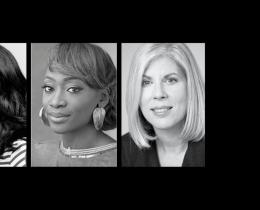Omega: Women make the majority of consumer decisions and actually control the majority of wealth in Western society. Employing women has been shown to improve companies' bottom lines. Yet women are still only 5% of CEOs. What is holding us back from positions of power, especially in the economic and business fields?
Gloria: The challenge of the 20th century was to open doors and change discriminatory laws. The challenge of the 21st century is for women to walk through those doors with the intention to achieve leadership parity. To do that, we must embrace the power and the responsibility to lead. And as we walk through the doors, we must take other women with us. I teach women to embrace their power with intention, confidence, and joy.
In order to embrace one’s power and get to that place, it's necessary to name and unpack implicit biases both men and women ingest at birth. Then it becomes fun and rewarding to practice positive disruptions that can overcome the biases in ourselves and others.
But we can’t do any of this alone. We need what I call #SisterCourage—the support to have conversations that really matter, ones that change the culture and let us know we’re not alone.
Omega: When it comes to ambition, women often have it—but are socialized to first consider what others need from us or think about us. How do you teach women to internalize a feeling and knowing of the right to be ambitious?
Gloria: We teach women to internalize their locus of power by unpacking and then redefining power from the old, no longer functional, and oppressive "power over" to the new, expansive, innovative, and positive "power to."
When a baby elephant is tethered to a post, she learns to move only in a circumscribed area. Even when she grows large and powerful, she could uproot the post or break the tether, but she doesn't know that and continues to move in the circumscribed area. The biggest challenge women have is to get the baby-elephant-thinking out of our minds. To know our power as human beings whose locus of power is internal, as consumers who purchase 85% of the products and services and have the power of the purse, and as leaders whose presence raises the collective intelligence of a company and allows it to make more money.
These are learnable, teachable skills. We can learn new ways of thinking, define ourselves for ourselves, and value ourselves. We can unlearn the cultural teachings that make our relationship with power ambivalent and fraught with fear. We can change systems that oppress or depress us and practice intentionality that puts the locus of power back into, and not outside, ourselves.
Over and over when I teach, I see women's faces relax and smiles return. They say, "Oh yes, I want that kind of power. With that kind of power, I can make life better for myself, my family, my community, the world." Power is not a finite pie. The more there is, the more there is! As we help and support other women, we increase our own power to do good in the world.
Omega: What attracted you to this work? When did you know you were an activist?
Gloria: The personal is always political and vice versa. I got ticked at discrimination that affected me personally—like “help wanted, male” ads that said I couldn’t apply for well-paying jobs. I married and had children in my teens. When the birth control pill became available, I realized I could plan my life more intentionally, and became aware that reproductive self-determination means a woman’s ability to determine anything else in their lives.
As my children grew, I needed to contribute to the family income. I was denied a credit card in my own name and refused a loan for a car without my then-husband becoming the responsible person. Incensed at the unfairness of it all, I had an epiphany while volunteering in the Civil Rights Movement: If there were civil rights, then women must have them, too.
That “pow”—or “power TO” moment I should say—awakened me to my passion in life. The Civil Rights Movement taught me that social change can happen, and I translated that to change how women are regarded and treated in society. That was a turning point—since then I have devoted my professional life and community service to advancing women.
Omega: Feminism brought strides in legislative rights, which women benefit from today, but we are also facing potential backward slides—especially in reproductive rights. What do you think accounts for this paradoxical moment in feminist history, and what is your hope for the “fourth wave” of feminism.
Gloria: This step forward followed by half a step (and sometimes a full step) back, often of our own volition, has been the pattern of the American women’s movement since it began in 1848.
It happened with abolition. It happened when Rosie the Riveter went back to the kitchen when Johnny came marching home. Even today women earn 57% of the college degrees but often leave the workforce at mid-career rather than walk through the doors that were opened for them. Women are socialized to take the boniest part of the chicken, leaving the meatier parts for others. And, most social movements get co-opted or lose steam when they win just enough that people get the illusion they have won everything and can go on to other things.
All that said, I’m convinced that we are experiencing a perfect storm in a good way for women—the justice case and the business case for women in leadership are converging for the first time. My hope for young feminists is they ride that wave, taking its energy to propel themselves and the world to a better place by redefining power and redesigning the hierarchical systems created during the industrial revolution by men for men, while women were working at home. And that they take their share of leadership positions and not shy away.
Young women today have male allies, for the first time, who want to be engaged parents, and that makes a huge difference in balancing power relationships at home, at work, and in politics.



